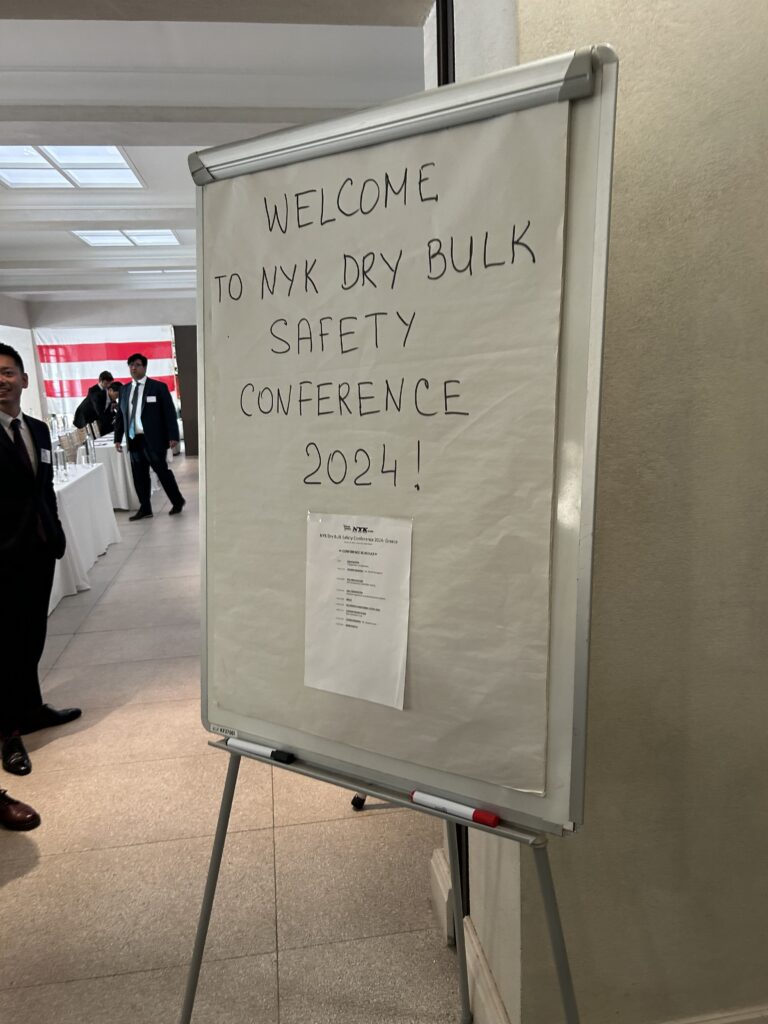
On January 25, Nippon Yusen Kaisha Line (NYK) held the NYK Dry Bulk Safety Practitioners Conference 2024 at the Ecali Club on the outskirts of Athens, Greece. This is the first time that NYK has held a safety conference for Greek shipowners. NYK used the stranding of a chip ship chartered by a Japanese shipowner off the coast of Hachinohe (Aomori Prefecture) in August 2021 as an opportunity to review how information should be shared with shipowners and ship management companies. In recent years, NYK has held safety meetings with Greek shipowners in light of the increase in time charters with overseas shipowners.
In his opening remarks, Hiroshi Kawaguchi, General Manager of the Dry Bulk Shipping Quality Group, said, “Our goal is safe operation. NYK’s ESG (environmental, social, and corporate governance) management is the key to safe operations.
In 1997, following the accidental oil spill aboard the 250,000 dwt Diamond Grace, a large crude oil tanker, at Nakanose in Tokyo Bay, NYK placed safety management at the core of its management.
In 1998, the company introduced its own unified safety standards, NAV9000 (see word). Under this standard, NYK has established evaluation criteria for the ship management systems of not only its own vessels but also those of Japanese shipowners with whom it has charter relationships, as well as those of its charters.
Captain Daniel Talifa Capital of the Dry Bulk Shipping Quality Group, who served as NYK’s lecturer at the safety conference, explained that even with a safety management system in place, accidents can still occur if there is a lack of communication with shipowners and ship management companies.
Mr. Daniel is a Filipino captain who has served on NYK vessels for many years. He was the NAV9000 speaker for the day.
He said, “Data from 2017 to 2023 shows a significant increase in the number of vessels chartered by NYK from overseas shipowners. I want Greek shipowners to know that Japanese shipping companies have a ‘moral responsibility’ even if they are charterers,” he said, explaining the business practices of the Japanese shipping industry.
In the event of a maritime accident (such as the incident off Hachinohe), operators (charterers) are required to report to the Japanese government, hold press conferences, and take other actions with sincerity. The important point is for operators and shipowners to report the situation of the ship in a timely manner and exchange information effectively with each other,” he said, referring to the position of operators.
On the other hand, what was the reaction of Greek shipowners to this safety meeting?
The majority of Greek shipowners responded positively to the Nippon Kaiji Shimbun interview.
The most common response was: “We have already been rigorously audited by major inspections by European and U.S. oil companies. We are confident that we can fully meet NYK’s safety standards” (a Greek shipowner based in Piraeus).
Some of them said, “This is the first time I have heard about the safety standards of Japanese shipping companies. The moral responsibility of operators is interesting in a Japanese sense” (a Greek shipowner based in the suburbs of Athens).
The event was attended by 74 Greek shipowners from 36 companies.
Following NYK’s presentation, DNV, a Norwegian classification society, gave a lecture on “Emission Regulations and CO2 Reduction Options”. Nippon Kaiji Kyokai (ClassNK) also gave a presentation on next-generation fuels.
Yasuaki Tsuno, Managing Director of NYK Bulkship (Atlantic), commented: “We were able to hear the opinions of Greek shipowners at this safety conference. We would definitely like to hold this event again next year,” he concluded.
In addition to NYK’s Atlantic base in Antwerp, Belgium, maritime engineers and representatives of Marcopay, NYK’s financial platform for seafarers, from the Philippines also attended the event.
NYK’s first safety meeting with Greek shipowners was more fruitful than expected.
(Athens=Hirofumi Yamamoto)
[Word].
NAV9000 NYK’s safety standards, which cover about 1,500 inspection items, are applied to about 800 vessels in operation, whether owned or chartered. NYK maritime engineers actually visit the vessels and conduct audits. In the case of chartered vessels, NYK maritime engineers also visit the shipowner’s headquarters to inspect the safety management system.